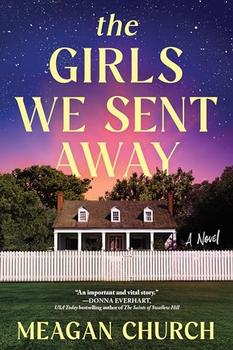Book Club Discussion Questions
Want to participate in our book club? Join BookBrowse and get free books to discuss!
Please be aware that this discussion guide will contain spoilers!
These questions were originally posted on the author's website at https://www.meaganchurch.com/bookclubs/
-
Lorraine hopes to become an astronaut in the Space Race, despite being a young woman in a time when those occupations were reserved for men. What was your biggest dream in life when you were young? Were you ever told that your dream would never be a reality? If so, how did that make you feel, and how did you overcome it?
-
There is a hierarchy in the Sunnymede neighborhood, and family image is worth everything. Where does Lorraine and her family land on that hierarchy, and how does that affect the way they react to her pregnancy?
-
Mr. Delford says that if Clint was man enough, he would have "dealt" with Lorraine's situation. What does he mean by this? What was your reaction to Clint's actions after finding out that Lorraine was pregnant?
-
What measures does Lorraine's mother take when she finds out her daughter is pregnant? If you were Lorraine, how would you have felt to be treated this way by your family?
-
Lorraine's story is set during the Baby Scoop Era, a period of the 1960s where unwed mothers could be sent away to give birth. Were you familiar with this period in history before reading this novel, and if so, what did you know about it? If not, did you learn anything new about this time?
-
The longer Lorraine lives in the maternity home, the more she realizes that it's not at all what she thought it would be. Describe what the home is like for those who live there. How would you feel if you were living in this situation?
-
What are some of the rules each girl must follow at the maternity home? Why are these rules in place, and were there any instances where the girls broke them?
-
Who is Janet, and why are the girls in the home keeping her story a secret from Lorraine? Were you surprised to learn the truth of what happened to her?
-
When Lorraine strikes up a friendship with the librarian, Ms. Whiler, she begins to see the role of women differently. Discuss how Lorraine's values and ideas surrounding womanhood and motherhood change as the story progresses. How did watching this change make you feel?
-
Lorraine was certain she didn't have a "motherly instinct." But when she feels like something is wrong with the baby, her immense worry proves that her attachment to her child has grown stronger than she previously thought. How does this realization change everything for Lorraine? Were you surprised by the outcome of the story after this moment?
-
On the surface, Miss Mahoney and Ms. Whiler seemed quite different, but how did Lorraine come to see them as more alike than she first thought them to be?
-
A major theme of the novel is the freedom to have a choice. What parallels might be drawn between the ideas of the Baby Scoop Era, and modern-day events surrounding woman's rights?
-
What is Lorraine and her mother's relationship like after she returns from the maternity home, and how does it change after the secrets her mother kept are revealed? Did you look at Mrs. Delford differently after this? Why or why not?
-
Near the end, Mrs. Delford and Lorraine come to think of strength differently. The narrator says, "Strength isn't in the loud and obvious. Strength is often camouflaged in the quiet, reserved places where most people wouldn't think to look." How do you describe strength? Has your definition changed over time? Who are the strong people in your life?
-
Discuss Lorraine and Alan's relationship. How was he different from Clint? How did you feel when he found her at the farmer's house after she returned home and then at the diner in the epilogue?
-
At the end of the novel, the narrator states that survival is "the constant decision to put one foot in front of the other." How does Lorraine continue to survive even after her immense hardship? Then, think about your life. What does the word "survival" mean to you?
Unless otherwise stated, this discussion guide is reprinted with the permission of Sourcebooks. Any page references refer to a USA edition of the book, usually the trade paperback version, and may vary in other editions.
